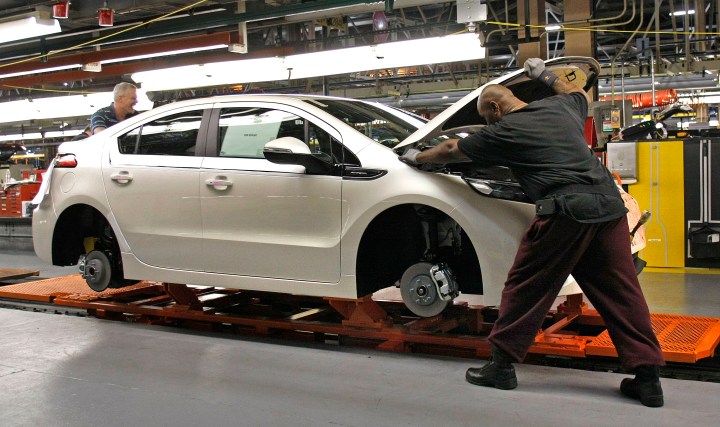
Why more people are leasing electric vehicles in the U.S.

Last summer, the Biden administration created a system of subsidies and incentives to promote the production and adoption of electric vehicles. Consumers and businesses could get several thousand dollars knocked off the price of a car if it was assembled in North America, and even more if its battery and critical minerals didn’t come from China.
The plan elicited a furious reaction from allies, and the U.S. has had to make some adjustments. That has led to some unexpected consequences and an uncertain future when it comes to promoting the use of electric vehicles. Marketplace’s Sabri Ben-Achour recently spoke with Chad Bown, a senior fellow at the Peterson Institute for International Economics, who has been writing about the topic.
The following is an edited transcript of their conversation.
Sabri Ben-Achour: So the U.S. in the Inflation Reduction Act basically says we are going to give all these tax breaks to electric vehicles if they are assembled in North America, and if they do not contain critical mineral source from China. What is the U.S. trying to achieve here? What are the goals?
Chad Bown: One is obviously to help the climate problem, to try to shift American consumers away from internal combustion engine vehicles and toward electric vehicles. But second, the Biden administration and Congress were really trying to incentivize automakers to create these electric vehicles and their supply chains in North America, and to have the supply chains for the key critical minerals and the battery components being outside of China. And China dominates the supply chain currently. We’re worried about that for geostrategic reasons, and all kinds of bigger concerns. So there were all these incentives to try to achieve those objectives.
Ben-Achour: Now, the European Union, South Korea, other allies, they get pretty mad about this. They say, “You know, we are your allies. We are also concerned about China, why are you doing this to us?” So what does the U.S. do in response to that?
Bown: What ended up happening is the Treasury Department, they released kind of a rule that said, there’s a separate track for these tax credits in the Inflation Reduction Act. So basically, you can lease an electric vehicle from Europe, from South Korea, get access to the tax credit, and that made trading partners much happier.
Ben-Achour: So what has been the consequence of these changes on the ground?
Bown: Leasing rates just bottomed out. Once Treasury made this announcement, suddenly, those numbers started to pick up. And now the latest numbers are something like 35%, 40% of electric vehicles that are coming into the market in the United States are now being leased. And this is up from 7%, 8%, 9% at the end of last year.
Ben-Achour: If we go back to the original goals behind this whole system of you know, promoting assembly in North America, reducing dependence on China, are we still meeting those goals?
Bown: Well, no, not really. Now you can actually source all the critical minerals from China, provided the vehicle is leased. So this is definitely a tradeoff. We’re likely to see a lot more electric vehicles coming to the market. This is good for climate. It’s also helping to smooth over concerns with some of our really key allies. But it is undermining one of the other key objectives as well.
There’s a lot happening in the world. Through it all, Marketplace is here for you.
You rely on Marketplace to break down the world’s events and tell you how it affects you in a fact-based, approachable way. We rely on your financial support to keep making that possible.
Your donation today powers the independent journalism that you rely on. For just $5/month, you can help sustain Marketplace so we can keep reporting on the things that matter to you.

















